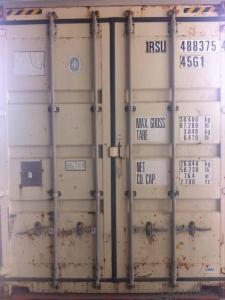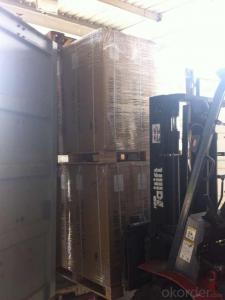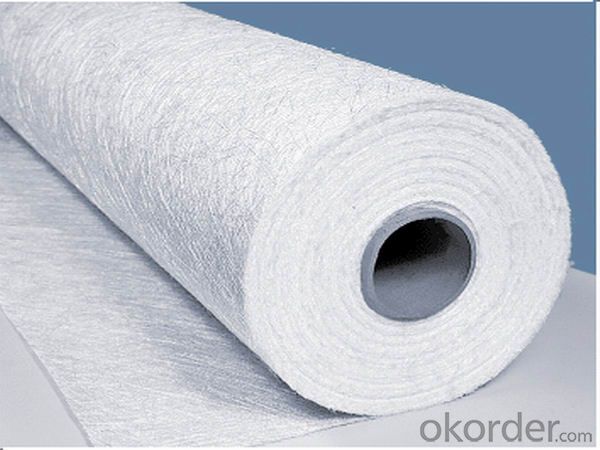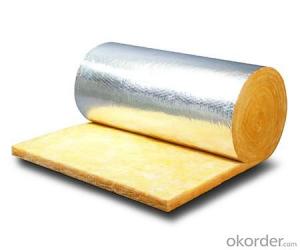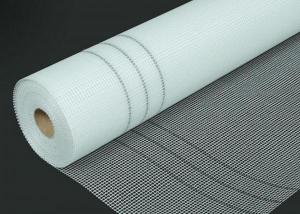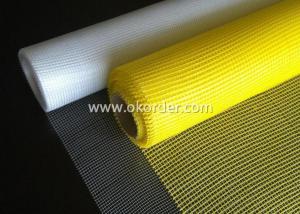Fiberglass Chopped Strand Mat With Powder Binder
- Loading Port:
- Shanghai
- Payment Terms:
- TT OR LC
- Min Order Qty:
- 20000 kg
- Supply Capability:
- 200000 kg/month
OKorder Service Pledge
OKorder Financial Service
You Might Also Like
1.Brief Introductions
Fiberglass chopped strand mat with powder binder is made of randomly distributed chopped strands held together by a powder binder.
The roll width ranges from 50mm to 3300mm.
Additional demands on wet-out and decomposition time may be available upon request.
2.Product Features
Fast breakdown in styrene
High tensile strength, allowing for use in hand lay-up process to produce large-area parts
Good wet-through and fast wet-out in resins, rapid air lease
3.Product Specifications
Property | Area Weight | Moisture Content | Size Content | Breakage Strength | Width |
(%) | (%) | (%) | (N) | (mm) | |
Property | IS03374 | ISO3344 | ISO1887 | ISO3342 | |
EMC80P | ±7.5 | ≤0.20 | 8-12 | ≥40 | 50-3300 |
EMC100P | ≥40 | ||||
EMC120P | ≥50 | ||||
EMC150P | 4-8 | ≥50 | |||
EMC180P | ≥60 | ||||
EMC200P | ≥60 | ||||
EMC225P | ≥60 | ||||
EMC300P | 3-4 | ≥90 | |||
EMC450P | ≥120 | ||||
EMC600P | ≥150 | ||||
EMC900P | ≥200 |
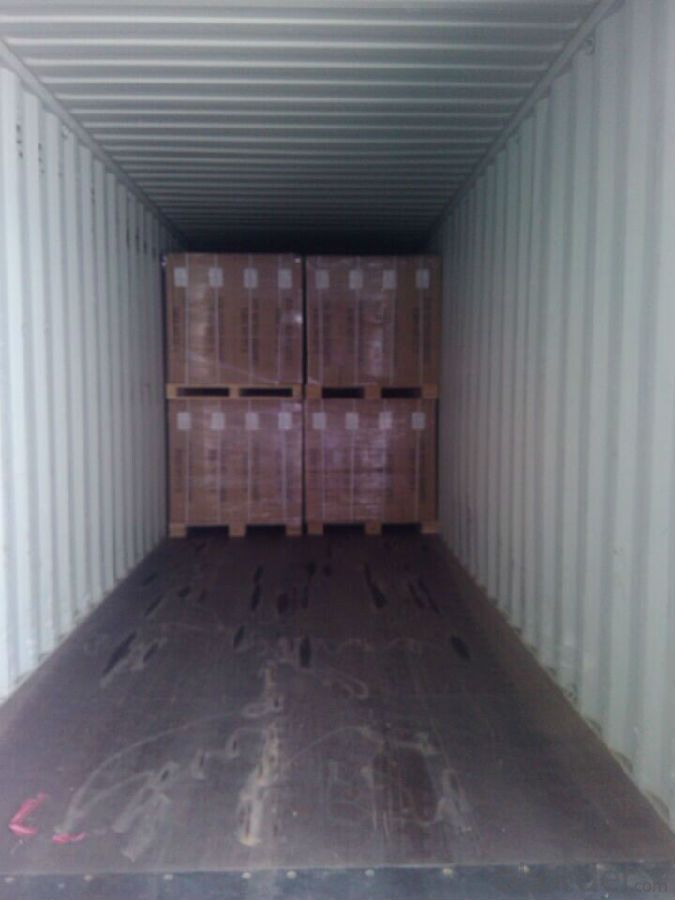
4.FAQ
Packaging:
Each Chopped Strand Mat is wound onto a paper tube which has an inside diameter of 76mm and the mat roll has a diameter of 275mm. The mat roll is wrapped up with plastic film,and then packed in a cardboard box or wrapped up with kraft paper. The rolls can be vertically or horizontally placed. For transportation, the rolls can be loaded into a cantainer directly or on pallets.
Delivery Time:
10-20 days after getting the down payment or original acceptable L/C.
- Q:Can fiberglass mat tissue be used for repairing fiberglass kayaks?
- Yes, fiberglass mat tissue can be used for repairing fiberglass kayaks. Fiberglass mat tissue is a lightweight material that is commonly used in the repair and reinforcement of fiberglass products, including kayaks. It is designed to be easily moldable and conform to the shape of the damaged area. By applying the fiberglass mat tissue with an epoxy resin, it can effectively reinforce and bond the damaged sections of a fiberglass kayak, restoring its strength and durability. It is important to ensure that the damaged area is properly prepared and the fiberglass mat tissue is applied correctly to achieve a strong and long-lasting repair.
- Q:Can fiberglass mat tissue be used for repairing fiberglass structures?
- Yes, fiberglass mat tissue can be used for repairing fiberglass structures. It is commonly used in the construction and repair of fiberglass boats, car bodies, and other fiberglass structures. The mat tissue provides added strength and reinforcement to the damaged area, making it an effective solution for repairing fiberglass structures.
- Q:How does fiberglass mat tissue compare to other insulation materials?
- Fiberglass mat tissue is a highly effective insulation material that offers several advantages over other insulation materials. Firstly, fiberglass mat tissue has excellent thermal insulation properties, which means it effectively prevents heat transfer and helps maintain a comfortable indoor temperature. This is particularly important in extreme climates where heat or cold can easily penetrate the building envelope. Additionally, fiberglass mat tissue is resistant to moisture, mold, and mildew, making it a durable and long-lasting insulation option. It does not absorb water, which helps to prevent the growth of mold and the degradation of the material over time. This is especially beneficial in humid environments or areas prone to moisture accumulation, such as basements or bathrooms. Furthermore, fiberglass mat tissue is non-combustible and has a high fire resistance rating. This makes it a safe choice for insulation, as it does not contribute to the spread of flames in case of a fire. It can also act as a barrier, preventing the fire from spreading to other areas of the building and offering occupants valuable time to evacuate. In terms of installation, fiberglass mat tissue is relatively easy to handle and install. It can be cut to fit any desired shape or size, allowing for flexibility during installation. It can also be used in various applications, including walls, floors, ceilings, and roofs, making it a versatile insulation material. Lastly, fiberglass mat tissue is an environmentally friendly option. It is made from recycled glass and sand, which helps reduce waste and conserve natural resources. It is also recyclable at the end of its lifespan, further minimizing its environmental impact. Overall, fiberglass mat tissue exhibits superior thermal insulation properties, durability, resistance to moisture and fire, ease of installation, and environmental sustainability, making it a highly favorable choice when compared to other insulation materials.
- Q:How does fiberglass mat tissue compare to other types of insulation materials?
- Fiberglass mat tissue offers several advantages over other types of insulation materials. Firstly, it has excellent thermal insulation properties, making it highly effective in reducing heat transfer and maintaining a comfortable indoor environment. Additionally, fiberglass mat tissue is lightweight, easy to handle, and can be easily installed in various applications, such as walls, roofs, and floors. It is also resistant to moisture, mold, and pests, ensuring long-lasting performance and durability. Moreover, fiberglass mat tissue is cost-effective and provides great value for money due to its high efficiency and low maintenance requirements. Overall, fiberglass mat tissue stands out as a reliable and efficient insulation material in comparison to others available in the market.
- Q:Can fiberglass mat tissue be used for insulation in chemical storage tanks?
- Yes, fiberglass mat tissue can be used for insulation in chemical storage tanks. Fiberglass is known for its excellent insulation properties, making it a suitable material for insulating tanks that store chemicals. The fiberglass mat tissue is typically made from fine glass fibers that are woven together to create a strong and durable material. This mat tissue can be applied to the inner walls of the tank to provide insulation and prevent heat transfer. Additionally, fiberglass is corrosion-resistant and can withstand the harsh chemicals often stored in these tanks, making it an ideal choice for insulation in chemical storage tanks.
- Q:Is fiberglass mat tissue compatible with different adhesives?
- Different adhesives can be used with fiberglass mat tissue. Fiberglass mat tissue is a versatile material that finds applications in construction, automotive, and aerospace industries. It acts as a reinforcement in composites, providing strength and durability when combined with resin and adhesive. Compatibility between fiberglass mat tissue and adhesives depends on various factors including adhesive type, specific application, and performance requirements. Epoxy, polyester, vinyl ester, and polyurethane adhesives are among the wide range of adhesives that can be compatible with fiberglass mat tissue. To ensure optimal adhesion and performance, it is important to consider the properties of both the adhesive and the fiberglass mat tissue. Factors such as curing time, viscosity, bond strength, and chemical resistance should be taken into account. In some cases, surface treatment or priming may be necessary to improve compatibility between the two materials. This can involve applying a primer or using a specific surface treatment method to promote adhesion and ensure a strong bond. In conclusion, fiberglass mat tissue can be used with different adhesives, but careful consideration of application requirements and selection of appropriate adhesive and surface treatment method is essential for achieving desired results.
- Q:What is the expected lifespan of fiberglass mat tissue?
- The lifespan of fiberglass mat tissue can differ based on several factors, including material quality, exposure conditions, and specific usage. Nonetheless, fiberglass mat tissue is renowned for its longevity and durability. When manufactured and installed correctly, fiberglass mat tissue has the potential to endure for many decades. It possesses resistance against decay, corrosion, and various chemicals, making it suitable for diverse industries and applications. Furthermore, fiberglass mat tissue is esteemed for its strength and capacity to withstand high temperatures. Nevertheless, it is crucial to acknowledge that prolonged exposure to harsh environmental elements, such as extreme temperatures, UV radiation, and moisture, may gradually degrade the material. Regular maintenance and appropriate care can aid in prolonging the lifespan of fiberglass mat tissue. In conclusion, while it remains challenging to determine an exact anticipated lifespan for fiberglass mat tissue, it is generally perceived as a long-lasting material when utilized and maintained properly.
- Q:Is fiberglass mat tissue resistant to termites and insects?
- Yes, fiberglass mat tissue is generally resistant to termites and insects. Fiberglass is made from woven glass fibers, which are not a food source for termites or insects. Additionally, fiberglass mat tissue is typically coated with a layer of resin, which further enhances its resistance to pests. This makes fiberglass mat tissue a popular choice for construction and insulation applications in areas prone to termite and insect infestations. However, it is worth noting that while fiberglass mat tissue itself is resistant to termites and insects, it does not guarantee complete protection against infestations. It is always advisable to take additional measures, such as proper sealing and regular inspections, to ensure long-term pest control.
- Q:Can fiberglass mat tissue be used for reinforcing pipes?
- Yes, fiberglass mat tissue can be used for reinforcing pipes. It provides strength and durability to the pipe structure, making it resistant to cracks and leaks.
- Q:Does fiberglass mat tissue require any special treatment for UV resistance?
- Special treatment is required for UV resistance when using fiberglass mat tissue. This tissue is composed of fine strands of glass fibers which can be easily damaged by prolonged exposure to ultraviolet (UV) radiation. The degradation of the fibers due to UV rays can result in a reduction in strength and dimensional stability. To enhance the UV resistance of fiberglass mat tissue, manufacturers often apply a unique coating or treatment to the material. This treatment serves to safeguard the fibers from UV radiation and prevent their deterioration. The specific treatment employed may vary based on the intended application and the desired level of UV resistance. Furthermore, it is important to acknowledge that despite the special treatment, fiberglass mat tissue may still experience some degree of UV damage over time. It is therefore advised to minimize direct sunlight exposure whenever possible to ensure the longevity and performance of the material.
1. Manufacturer Overview |
|
|---|---|
| Location | |
| Year Established | |
| Annual Output Value | |
| Main Markets | |
| Company Certifications | |
2. Manufacturer Certificates |
|
|---|---|
| a) Certification Name | |
| Range | |
| Reference | |
| Validity Period | |
3. Manufacturer Capability |
|
|---|---|
| a)Trade Capacity | |
| Nearest Port | |
| Export Percentage | |
| No.of Employees in Trade Department | |
| Language Spoken: | |
| b)Factory Information | |
| Factory Size: | |
| No. of Production Lines | |
| Contract Manufacturing | |
| Product Price Range | |
Send your message to us
Fiberglass Chopped Strand Mat With Powder Binder
- Loading Port:
- Shanghai
- Payment Terms:
- TT OR LC
- Min Order Qty:
- 20000 kg
- Supply Capability:
- 200000 kg/month
OKorder Service Pledge
OKorder Financial Service
Similar products
New products
Hot products
Hot Searches
Related keywords

